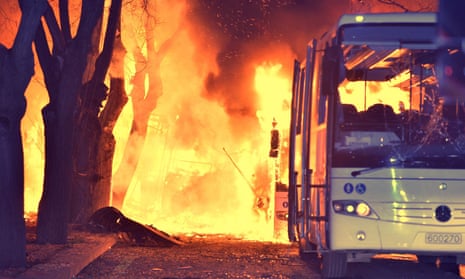In the absence of any immediate claims of responsibility for Wednesday evening’s rush-hour car bomb attack on a military convoy in Ankara, suspicion is likely to fall, first and foremost, on Kurdistan Workers party (PKK) militants who have been engaged in a renewed, low-intensity conflict with Turkey’s army and security forces since last summer.
That said, such suspicion may not be right. It would be unusual for the PKK, which is seeking greater autonomy for predominantly ethnic Kurdish areas of south-east Turkey, to mount an “out-of-territory” operation, in this case attacking the heart of the Turkish state. The prime minister’s office and parliament, as well as military headquarters, are close by the scene of the blast.
On the other hand, the PKK routinely confines itself to military or security forces targets, and not civilian targets. It would regard a military convoy of buses carrying army personnel as a legitimate target.
If the PKK does prove responsible for the attack, it will be interpreted as a direct response to a campaign of military crackdowns, arrests and curfews in Kurdish areas that have followed the sudden collapse of a ceasefire in July last year.
Fighting intensified in December and led to escalating clashes, including one around Diyarbakır last month in which 20 Kurdish militants and three Turkish soldiers died.
More than 600 PKK members have died in recent fighting, according to official figures. Kurdish political leaders and human rights groups say more than 200 civilians have also been killed and thousands displaced.
Ahmet Davutoğlu, Turkey’s prime minister – who cancelled a visit to Brussels after the attack – said last month that the security operation against the PKK was all but over. “The process is to a large extent completed,” he said. “It won’t be like with old operations, withdrawing after streets are cleansed. There will be a more orderly security presence. The goal is to build a public order ... in which no illegal structure can take control of any streets.”
But no new ceasefire has been agreed with the PKK, peace talks with its jailed leader, Abdullah Öcalan, have been suspended and hostilities have continued sporadically. If the PKK did set Wednesday’s car bomb trap for the military, it will serve as a reminder to Davutoğlu and others that this 40-year-old conflict that has claimed an estimated 40,000 lives is far from finished.
Blaming the PKK when thing go wrong is a natural government reflex. When suicide bombers attacked a peace rally in Ankara last October, killing more than 100 people, Recep Tayyip Erdoğan, Turkey’s president, was too quick to blame the Kurds. His reaction appeared politically motivated.
As it turned out, Islamic State terrorists appear to have been responsible for the October atrocity. Isis militants from Syria, or the group’s sympathisers inside Turkey, will again come under suspicion this time around.
Another possibility is that the PKK’s allies in Syria, the Kurdish Democratic Union (PYD) and its armed wing, the People’s Protection Units (YPG), may have been involved in the blast. Turkey’s army has been shelling YPG positions in northern Syria in recent days following Kurdish territorial gains.
The YPG advances have been supported by Russian air power, part of a wider power struggle between Ankara and Moscow over the future control of Syria as a whole – and its Kurdish areas in particular. If the YPG is responsible, this would be seen as a major escalation and a provocation that could prove the trigger for a frequently threatened but yet to be launched, on-the-ground Turkish military intervention in northern Syria.
Speaking after last October’s attacks, Davutoğlu named two other organisations in addition to the PKK and Isis as possible culprits – the Revolutionary People’s Liberation Party-Front (DHKP-C) and the Marxist-Leninist Communist party (MLKP). But like Turkey’s extremist nationalist groups, neither has a history of large-scale attacks.
Whoever may have caused the car bombing, the Turkish public may be the last to know the facts, thanks to a ban on media reporting imposed by the government in the name of national security. As in the past, such restrictions will encourage conspiracy theories and claims of official coverup, and may make it harder to get to the truth.
